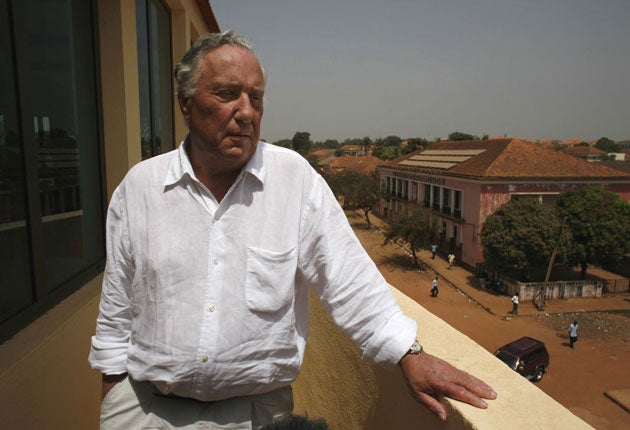The author and the coup he didn't have to invent
When Guinea-Bissau's President was assassinated, guess which novelist happened to be in the country

It could have been a scene out of one of his own thrillers. And when his next novel is published, it may very well be.
The British author Frederick Forsyth flew to Guinea-Bissau this week to research his latest novel, and found real life trumping fiction.
Hours before he touched down in the west African nation, a bomb hidden under a staircase blew apart the armed forces chief. Hours later, the President was shot dead and according to Forsyth, hacked to pieces.
The double assassination of President Joao Bernardo "Nino" Vieira and his military rival, General Batiste Tagme na Waie, shocked the country and clouded this sweaty equatorial capital in the kind of mystery and intrigue often detailed in Forsyth's own fiction about assassins, spies and coups.
His presence here inevitably drew comparisons with his hit novel The Dogs of War, which is about mercenaries trying to stage a coup in a mineral-rich, African backwater.
"I didn't come for a coup d'etat or regime change, but that's what I ran into," Forsyth said over coffee at his hotel. He had been reading in bed when he had heard a boom before dawn on Monday and thought, "that wasn't a car door slamming".
The explosion was blocks away at Mr Vieira's modest downtown villa – the beginning of the President's end. Forsyth later saw troops patrolling the streets but they left him alone.
That night, he had dinner with the Dutch pathologist who had performed the autopsy on Mr Vieira and had spent the morning "trying to put the President back together again".
According to Forsyth's sources, Mr Vieira, 71, survived an initial rocket attack only to be shot four times, "slung into the back of a pick-up truck... and cut to pieces with machetes" by soldiers bent on avenging their own chief's death.
Forsyth said he came here for "the flavour, the odour, of a pretty washed-up, impoverished, failed west African mangrove swamp".
"I thought, what is the most disastrous part of west Africa, and by a mile, it's Guinea-Bissau. If you drive around you'll see why: one wrecked building after another, one mountain of garbage after another. A navy with no ships, an air force with no airplanes."
Forsyth was an RAF pilot in the late 1950s and then spent 12 years as a foreign correspondent for the Reuters news agency and the BBC.
His first attempt at fiction, The Day of the Jackal, was about a plot to assassinate the French president, Charles de Gaulle. Published in 1971, it was an international best-seller.
In 1974 came The Dogs of War, set in a fictional nation modelled on Equatorial Guinea. Forsyth's next novel, which he expects to publish next year, will be set in Guinea-Bissau. He has stopped inventing fictional places "because the world is so weird and so scary, you might as well use the real ones."
Forsyth said he spent much of his three days in Bissau talking with expatriates, who he said could speak more freely than government officials and could see the nation's history "from an outsider's point of view".
The novel will be another "international thriller involving the usual mix of forces of law and order, criminality, special forces, US Green Berets, a coup d'etat, and a lot of money".
Asked if he misses the life of a foreign correspondent, Forsyth said: "Investigative journalism is like a drug. When you write, it's very hard to walk way.
"If push comes to shove I could still cover a story. But in Guinea-Bissau, there is no need to exaggerate," he said. "This place is for real."
Join our commenting forum
Join thought-provoking conversations, follow other Independent readers and see their replies
Comments